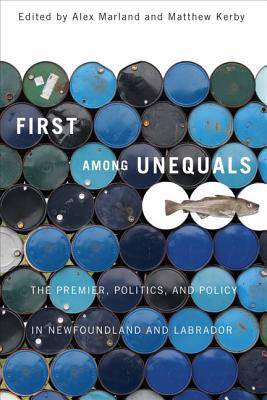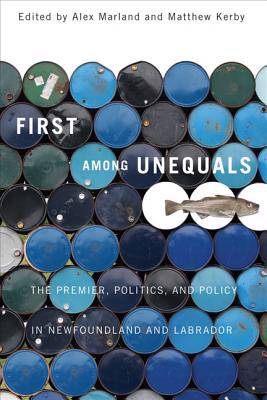
- Afhalen na 1 uur in een winkel met voorraad
- Gratis thuislevering in België vanaf € 30
- Ruim aanbod met 7 miljoen producten
- Afhalen na 1 uur in een winkel met voorraad
- Gratis thuislevering in België vanaf € 30
- Ruim aanbod met 7 miljoen producten
Zoeken
First Among Unequals
The Premier, Politics, and Policy in Newfoundland and Labrador
Alex Marland, Matthew Kerby
Hardcover | Engels
€ 177,45
+ 354 punten
Uitvoering
Omschrijving
Canadians are told that provincial premiers wield considerable sway. Critics decry premiers as autocrats and dictators, while supporters label them as altruists and great leaders. In Newfoundland and Labrador the premier is expected to be the province's overlord, a patriotic defender of provincial interests, and the decision-maker who brokers competing policy priorities. But does a premier have as much power over government policy decisions as is popularly believed? First among Unequals, a detailed enquiry into the administration of Premier Danny Williams and the first year of his successor Kathy Dunderdale, suggests that the power of the premier is exaggerated by the media, critics, political parties, the public service, and the leaders themselves. With perspectives from economics, education, geography, health policy, history, and political science, contributors explore how dominant Williams was and test theories to show how power operates in provincial governments. They examine politics and government through case studies of the healthcare sectors, education, the fisheries, rural and regional development, hydroelectric projects, and the labour market. Focusing on an era of political populism and rapid economic growth, First among Unequals reasons that there is not enough evidence to suggest that the Premier's Office - even with someone like Danny Williams at the helm - independently shapes public policy. Contributors include Karlo Basta (Memorial), Sean Cadigan (Memorial), Angela Carter (Waterloo), Christopher Dunn (Memorial), Jim Feehan (Memorial), Gerald Galway (Memorial), Ryan Gibson (Memorial), James Kelly (Concordia), Royce Koop (Manitoba), Mario Levesque (Mount Allison), Maria Mathews (Memorial), John Peters (Laurentian), Michelle Porter (Memorial), Kate Puddister (McGill), Valérie Vézina (UQAM), and Kelly Vodden (Memorial, Grenfell).
Specificaties
Betrokkenen
- Auteur(s):
- Uitgeverij:
Inhoud
- Aantal bladzijden:
- 366
- Taal:
- Engels
Eigenschappen
- Productcode (EAN):
- 9780773543447
- Verschijningsdatum:
- 23/05/2014
- Uitvoering:
- Hardcover
- Formaat:
- Genaaid
- Afmetingen:
- 160 mm x 231 mm
- Gewicht:
- 657 g

Alleen bij Standaard Boekhandel
+ 354 punten op je klantenkaart van Standaard Boekhandel
Beoordelingen
We publiceren alleen reviews die voldoen aan de voorwaarden voor reviews. Bekijk onze voorwaarden voor reviews.











